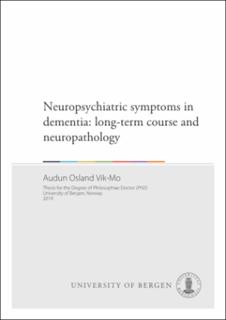| dc.contributor.author | Vik-Mo, Audun Osland | en_US |
| dc.date.accessioned | 2019-09-13T12:42:20Z | |
| dc.date.available | 2019-09-13T12:42:20Z | |
| dc.date.issued | 2019-06-14 | |
| dc.identifier.isbn | 9788230863015 | en_US |
| dc.identifier.uri | https://hdl.handle.net/1956/20835 | |
| dc.description.abstract | Aim: Neuropsychiatric symptoms (NPS) such as anxiety, apathy, and psychosis are important manifestations of dementia that have a major impact on the patient’s quality of life, carer burden, and risk of institutionalisation. There are few treatment options, the clinical course is not understood, and the mechanism behind the symptoms is unknown. This thesis analyses the frequency, long-term course, and pathological underpinnings of NPS. Methods: The Demvest study is a 12-year prospective longitudinal multicentre cohort study in the western part of Norway. Among the 667 patients with suspected mild dementia who were screened, 223 fulfilled the inclusion criteria were included and followed with annual assessments using the Neuropsychiatric Inventory (NPI). The attrition rate was very low, and data from 56 patients who underwent autopsy after death confirmed that the clinical diagnoses were highly accurate. The diagnostic distribution was 113 patients with Alzheimer’s disease (AD), 86 patients with Lewybody dementia (LBD), and 24 patients with other types of dementia. Results: NPS were common at baseline and only a moderate increase in NPS was observed during the first 5 years. There was also no increase in the proportion of patients with high NPI total scores. LBD was associated with a higher NPI total score and higher psychotic symptom scores. Most patients had a relapsing course or single symptomatic episodes rather than persistent symptoms, and 57% of AD and 84% of DLB patients had reoccurring psychotic symptoms. We found a significant association between cerebral amyloid angiopathy and psychosis in AD. Discussion: Severe NPS are already common at time of dementia diagnosis, and their increase with disease progression is moderate. We observed a highly individual course of NPS with unstable symptomatology. Cerebrovascular disease may increase the risk of psychosis in AD. The individual variations in NPS over time underline the need for personalised medicine in dementia care. NPS, including psychotic symptoms, should be highlighted as a natural part of the dementia syndrome. | en_US |
| dc.language.iso | eng | eng |
| dc.publisher | The University of Bergen | eng |
| dc.relation.haspart | Paper I: Course of neuropsychiatric symptoms in dementia: 5-year longitudinal study. International Journal Geriatric Psychiatry, 2018. The article is available in the main thesis. The article is also available at: <a href="https://doi.org/10.1002/gps.4933" target="blank">https://doi.org/10.1002/gps.4933</a> | en_US |
| dc.relation.haspart | Paper II: The individual course of neuropsychiatric symptoms in people with Alzheimer’s and Lewy body dementia: a 12-year longitudinal cohort study. Full text not available in BORA. | en_US |
| dc.relation.haspart | Paper III: Advanced cerebral amyloid angiopathy and small vessel disease are associated with psychosis in Alzheimer’s disease. Journal of Neurology, Neurosurgery and Psychiatry, 2018. Full text not available in BORA due to publisher restrictions. The article is available at: <a href="http://dx.doi.org/10.1136/jnnp-2018-318445" target="blank">http://dx.doi.org/10.1136/jnnp-2018-318445</a> | en_US |
| dc.title | Neuropsychiatric symptoms in dementia: long-term course and neuropathology | en_US |
| dc.type | Doctoral thesis | |
| dc.rights.holder | Copyright the author. All rights reserved | |
| dc.identifier.cristin | 1707495 | |
